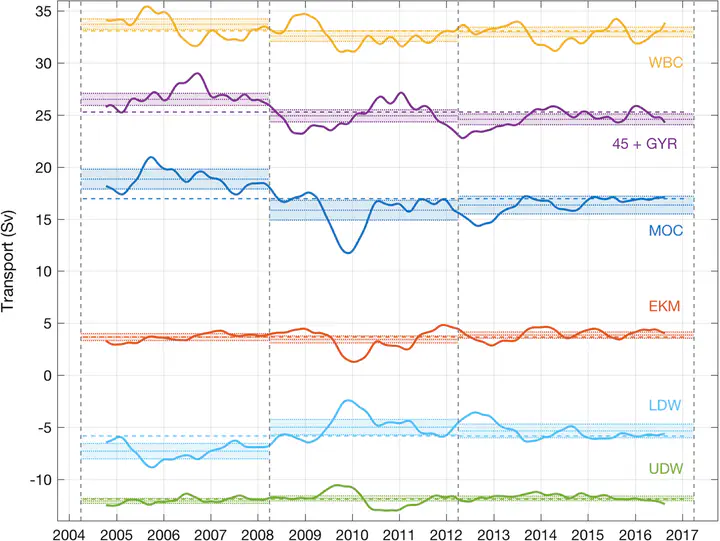 Low-pass filtered transports from 26°N. For all variables, positive values imply northward transport. The total Atlantic Meridional Overturning Circulation (AMOC) (MOC) and the Ekman component (EKM) are shown. The non-Ekman part of the upper limb of the AMOC is the net sum of a northward western boundary component (WBC) and a southward recirculation in the gyre (GYR). So that it can be shown easily on the same plot, a value of 45 Sv has been added to GYR. The southward flowing lower limb of the AMOC is separated into the upper North Atlantic Deep Waters between 1,100 m and 3,000 m depth (UDW) and lower North Atlantic Deep Waters between 3,000 m and 5,000 m (LDW). The thick continuous lines are 12 month low-pass (Tukey) filtered data. The mean values for the whole time series are shown as dashed lines. Means are shown for three periods: April 2004 to March 2008, April 2008 to March 2012, and April 2012 to March 2017. The 95% confidence intervals for these means are shown by shading.
Low-pass filtered transports from 26°N. For all variables, positive values imply northward transport. The total Atlantic Meridional Overturning Circulation (AMOC) (MOC) and the Ekman component (EKM) are shown. The non-Ekman part of the upper limb of the AMOC is the net sum of a northward western boundary component (WBC) and a southward recirculation in the gyre (GYR). So that it can be shown easily on the same plot, a value of 45 Sv has been added to GYR. The southward flowing lower limb of the AMOC is separated into the upper North Atlantic Deep Waters between 1,100 m and 3,000 m depth (UDW) and lower North Atlantic Deep Waters between 3,000 m and 5,000 m (LDW). The thick continuous lines are 12 month low-pass (Tukey) filtered data. The mean values for the whole time series are shown as dashed lines. Means are shown for three periods: April 2004 to March 2008, April 2008 to March 2012, and April 2012 to March 2017. The 95% confidence intervals for these means are shown by shading.Abstract
The Atlantic Meridional Overturning Circulation (AMOC) is responsible for a variable and climatically important northward transport of heat. Using data from an array of instruments that span theAtlantic at 26N, we show that the AMOC has been in a state of reduced overturning since 2008 as compared to 2004–2008. This change of AMOC state is concurrent with other changes in the North Atlantic such as a northward shift and broadening of the Gulf Stream and altered patterns of heat content and sea surface temperature. These changes resemble the response to a declining AMOC predicted by coupled climate models. Concurrent changes in air-sea fluxes close to the western boundary reveal that the changes in ocean heat transport and sea surface temperature have altered the pattern of ocean-atmosphere heat exchange over the North Atlantic. These results provide strong observational evidence that the AMOC is a major factor in decadal-scale variability of North Atlantic climate